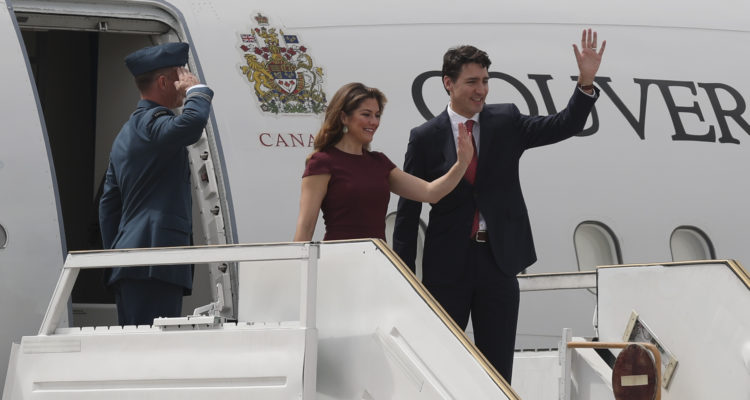Trudeau’s wife is the only member of the family with symptoms.
By Associated Press
Canadian Prime Minister Justin Trudeau’s wife has tested positive for the new coronavirus, his office announced Thursday night.
It said Sophie Grégoire Trudeau was felling well and would remain in isolation.
“The Prime Minister is in good health with no symptoms. As a precautionary measure and following the advice of doctors, he will be in isolation for a planned period of 14 days,” the statement added.
His office said the doctor’s advice to the prime minister is to continue daily activities while self-monitoring, given that he is exhibiting no symptoms himself.
“Also on the advice of doctors, he will not be tested at this stage since he has no symptoms. For the same reason, doctors say there is no risk to those who have been in contact with him recently,” the statement said.
The office said he would resume his duties Friday.
Trudeau’s wife issued a statement thanking those who have reached out.
“Although I’m experiencing uncomfortable symptoms of the virus, I will be back on my feet soon,” she said. “Being in quarantine at home is nothing compared to other Canadian families who might be going through this and for those facing more serious health concerns.”
The couple have three children, but Trudeau’s wife is the only member of the family with symptoms, the prime minister’s office said.
Though self-quarantining himself, Trudeau is spending the day in briefings, phone calls and virtual meetings from home, including speaking with other world leaders and joining a special Cabinet committee discussion on the coronavirus. Trudeau spoke with U.S. President Donald Trump and British Prime Minister Boris Johnson.
But Trudeau did cancel an in-person meeting with Canada’s provincial premiers.
Opposition NDP leader Jagmeet Singh was also working from home after feeling unwell. Singh said he had been in contact with a doctor and they do not believe he has the virus but was advised to limit contact with the public until he feels better.
Ontario, Canada’s most populous province, is closing schools until April 5.
Quebec Premier Francois Legault is asking all people returning from travel abroad to self-isolate for 14 days. The measure will be mandatory for all government employees.
He is also asking organizers to cancel all indoor events attracting crowds of more than 250 people and all other large gatherings that are not considered essential. Alberta and British Columbia are also urging all events with more than 250 people be cancelled.
British Columbia’s health officer, Dr. Bonnie Henry, said the province is “strongly advising” people to not travel outside Canada, including to the U.S, and said anyone who chooses to do so should self-isolate for 14 days upon return.
“That means no trips to Disneyland, no trips to Paris or Berlin or Boise,” British Columbia Health Minister Adrian Dix said. “Anyone who chooses to travel outside of Canada must stay away from work or school or 14 days upon their return. That responsibility is what we owe to our fellow citizens.”
Henry said there has not been widespread community transmission of the virus in Canada, unlike in the U.S.
“We’ve been watching what’s happening in Washington state and have been in contact with our colleagues in Washington state. What became apparent to me over the last 24 hours is the extent of the community spread in many, many, many different communities in the U.S.,” Henry said.
Canada has more than 140 confirmed cases, with one death — an elderly nursing home resident in British Columbia. The United States has had 40 deaths, with more than three-fourths of them in Washington state. As of Thursday afternoon, the Centers for Disease Control and Prevention reported about 1,260 U.S. illnesses.
Alberta Premier Jason Kenney also asked people to self-isolate if they are returning from overseas.
“We are now recommending anybody over the age of 65 to avoid traveling outside the province if they can avoid it,” Kenney said.





